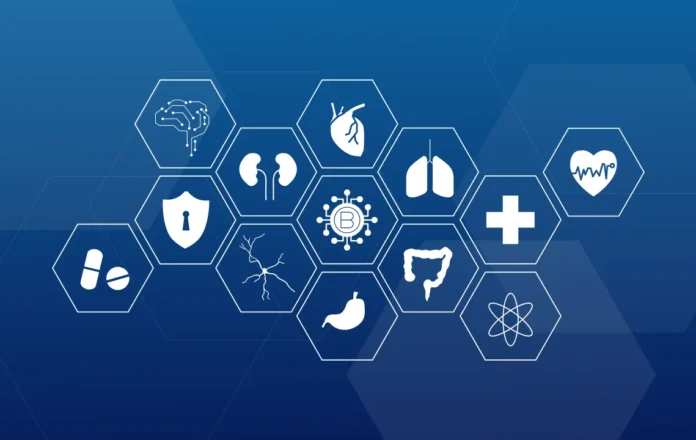The global blockchain in the healthcare market is at the forefront of revolutionizing the healthcare and pharmaceutical industries, leveraging innovative blockchain technology to address key challenges and unlock new opportunities. A decentralized digital ledger system, offers enhanced security, transparency, and efficiency in data management and transactions, making it a game-changer in healthcare.
Blockchain technology in healthcare is witnessing substantial growth and adoption, driven by several factors. The increasing need for secure and interoperable health data management. Blockchain enables the secure sharing and storage of patient health records, ensuring data integrity, privacy, and accessibility across healthcare providers and systems. This facilitates seamless care coordination, reduces administrative burdens, and improves patient outcomes. According to Growth Market Reports, the global blockchain in healthcare market size was about USD 1.94 Billion in 2022 and is likely to reach USD 175.8 Billion by 2031.
Moreover, blockchain in pharmaceuticals is revolutionizing drug supply chain management and authentication. By implementing blockchain, pharmaceutical companies can track and trace the entire lifecycle of pharmaceutical products, from manufacturing to distribution and consumption. This ensures product authenticity, prevents counterfeit drugs, and enhances patient safety by providing transparent information about medication origins and quality.
The global blockchain in healthcare market presents numerous upcoming opportunities for industry players and stakeholders. One of the key opportunities lies in optimizing clinical trials and research processes. Blockchain enables secure and transparent management of clinical trial data, facilitating data sharing among researchers, ensuring data integrity, and streamlining trial protocols. This can accelerate drug development, reduce costs, and improve collaboration among stakeholders.
Furthermore, blockchain technology in healthcare opens avenues for innovative healthcare delivery models, such as telemedicine, remote patient monitoring, and personalized medicine. Blockchain-enabled platforms can securely store and manage patient-generated health data, facilitate remote consultations, and support personalized treatment plans based on individual health profiles and genomic data. This fosters patient-centric care, improves healthcare access, and empowers patients to take control of their health. According to the DataIntelo report, the Global Blockchain Technology in Healthcare Market is expected to grow at a CAGR of 64.2% during 2020-2026.
The effect of blockchain in healthcare extends beyond the healthcare sector, influencing various industries and market segments. Blockchain’s impact on healthcare data security and interoperability can enhance trust and collaboration among healthcare stakeholders, including providers, payers, regulators, and patients. This fosters a data-driven healthcare ecosystem that promotes innovation, transparency, and accountability.
Additionally, blockchain in healthcare has implications for healthcare payment systems and revenue cycle management. Blockchain-based payment solutions offer secure and transparent transactions, reduce payment processing times, mitigate fraud and billing errors, and improve financial transparency and accountability. This can lead to cost savings, operational efficiencies, and improved revenue management for healthcare organizations.
Another emerging opportunity in the blockchain in the pharmaceutical market is the potential for decentralized healthcare data marketplaces. Blockchain technology enables the creation of secure and decentralized data marketplaces where patients can securely share their health data with researchers, pharmaceutical companies, and other stakeholders. This opens new possibilities for data-driven research, precision medicine, and healthcare innovation. As per the Up Market Research report, the global blockchain in pharmaceutical market is expected to generate the highest share of the market in the projected period.
Decentralized data marketplaces empower patients to control their data, decide who can access it, and even monetize their data contributions. This shift toward patient-centric data management and sharing models has the potential to drive collaboration, accelerate medical breakthroughs, and improve healthcare outcomes on a global scale.
Blockchain technology in healthcare is poised to transform the healthcare landscape, offering unprecedented opportunities for innovation, efficiency, and patient-centric care. Market players embracing blockchain solutions are well-positioned to drive positive change, enhance healthcare outcomes, and contribute to a more resilient and sustainable healthcare ecosystem. As blockchain continues to evolve and integrate into healthcare systems, its impact will be felt across industries, paving the way for a future of interconnected, secure, and data-driven healthcare services.















